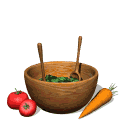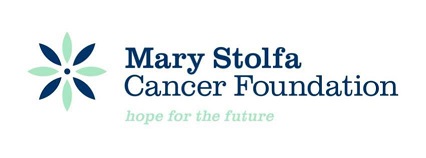| |

Cancer is the second leading cause of death in the United States. One in every four deaths in the U.S. is from cancer. Good nutrition is an important way to help lower your cancer risk. The National Cancer Institute estimates that at least 35% of all cancers have a nutritional connection. A healthy diet low in fat, high in fiber, and with lots of fruits and vegetables have been shown to help reduce the probability of developing cancer. To help prevent certain cancers and other chronic diseases, experts recommend 5–9 servings of fruits and vegetables daily. This includes 2–4 servings of fruits and 3–5 servings of vegetables, with dark-green and deep-yellow vegetables making up about one-third (about 1 to 2 servings) of the vegetable servings. There is no direct evidence that America's favorite vegetable, the white potato, protects against cancer.
While five servings of fruits and vegetables is the minimum daily recommendation, estimates based on caloric needs suggest that Americans actually need an average of seven daily servings. These additional servings should replace sources of "empty calories" in the diet, such as added sugars and fats, to avoid taking in too many calories.
To begin a healthy eating lifestyle, we should start focusing on eating a variety of foods every day. No one food contains all the nutrients you need. Emphasize fruits and vegetables. They contain a wide array of compounds, or phytonutrients, which are reported to have anti-cancer activity in cell cultures. Raw or cooked vegetables, fruits, and fruit juices provide the vitamins, minerals, and fiber you need. Research suggests that people who eat diets with lots of vegetables may have lower risks for some cancers, including cancers of the stomach, lung, colon, prostate, bladder, esophagus and larynx. The cancer protection of fruits and vegetables may be due to the high levels of fiber and vitamins. Try to eat five or more servings each day. Make fruits easily accessible by keeping a bowl of them on your kitchen table and counter. If they’re in front of you, you’re more liable to eat them. Increase certain compounds such as fiber that are also found in fruits, vegetables and cereal grains. Laboratory research has shown that certain compounds such as fiber can actually interfere with the process of cancer development. Whole grains are a great way to increase your fiber intake. They are low in fat and a good source of vitamins, minerals, and protein.
Breads and cereals, especially the whole grain varieties, such as whole wheat bread, oats, and brown rice are all good sources of complex carbohydrates, vitamins, minerals, and fiber. Go easy on fat, salt, sugar, alcohol, and smoked or pickled foods.
If we emphasize eating less foods containing "empty" nutrients and calories, such as desserts, cakes, candies and many items made from saturated fats, we can focus more on the foods that provide us with the vitamins and minerals our body needs. You don’t want to deny yourself from eating the foods you enjoy all of the time. But a good way to maintain a healthy diet while still enjoying those tasty treats you like is by choosing healthy foods at least 80% of the time and "pleasure" foods 20% of the time.
Lower your fat intake. Replace foods high in fat, with fruits, vegetables, grains and beans. Replace high caloric foods with healthy recipes and products with less fat (such as 1% milk, low-fat/non-fat salad dressings, and other "lite" foods) One word of advice, just because something is fat free or low fat doesn’t mean you can eat as much of it as you want. Many low-fat or nonfat foods have a lot of sugar and are high in calories. Eat everything in moderation. Be sure to use butter sparingly. When adding to potatoes, corn on the cob, toast, etc., we don’t realize how much we’re actually using. Even better, try switching to reduced-fat margarine, or try jelly on your bread, bagels, and other baked goods. If you like to eat meat, you don’t have to give it up. But you can reduce fat by choosing lean cuts of meat. All cuts with the name "loin" or "round" are lean. If you’re cooking it yourself, trim any visible fat and drain the grease. Also, a great alternative to meat is beans. And as far as fried foods are concerned, they taste great, but aren’t great for you. They’re high in fat. Rather than frying, try baking, steaming, poaching or broiling.
If you drink alcoholic beverages, do so in moderation. Research has shown a strong association between alcohol use and the development of cancer.
Restaurants usually serve twice the size of a single portion. Try asking for a "doggy bag" for half your meal. That way you can have the leftovers for lunch or dinner the next day. If you’re eating fast food, try ordering a lean roast beef sandwich or grilled chicken sandwich. Do your own "fixings", don’t "double" size anything, and order items without cheese.
People that are overweight are more likely to develop certain types of cancer. For women, these include cancer of the uterus, cervix, breast and colon. For men, these include a higher risk of cancer of the colon, rectum, and prostate. Try maintaining a healthy weight by eating right and keeping active.
A diet low in fat, high in fiber, and rich in fruits and vegetables may help reduce your cancer risk as well as your overall wellbeing. Physical activity can actually protect against some cancers. At least thirty minutes of physical activity on most days of the week is recommended.
Whether or not you’ve had cancer or are recovering from cancer, good nutrition is important. One important way to stay healthy is by taking action to reduce your risk.
Eating Hints for Cancer Patients: Before, During and After Treatment
Other Nutritional Links:
CDC and Nutrition
DC and Physical Activity
Cancer Nutrition Center


The information on this web site is provided for general information only. It is not intended as medical advice, and should not be relied upon as a substitute for consultations with qualified health professionals who are familiar with your individual medical needs. The MSCF disclaims all obligations and liabilities for damages arising from the use or attempted use of the information, including but not limited to direct, indirect, special, and consequential damages, attorneys' and experts' fees and court costs. Any use of the information will be at the risk of the user.
| Eating Hints for Cancer Patients | The Food Guide Pyramid | Prevention | Quit Smoking |
| About Mary Stolfa | Our Mission | Newsletter | Volunteer | Beauty Parlor | News Articles | Clinical Trials | Other Resources for Cancer Information | Nutrition | Acknowledgement, Awards & Public Acclaim | Foundation Projects | MSCF Products |
| Return Home | Fundraisers | Donations | Wall of Honor | Stories of Hope | Information on Specific Cancers (A-M) | Cancer Issues | Contact Us | Site Index |
|
|






